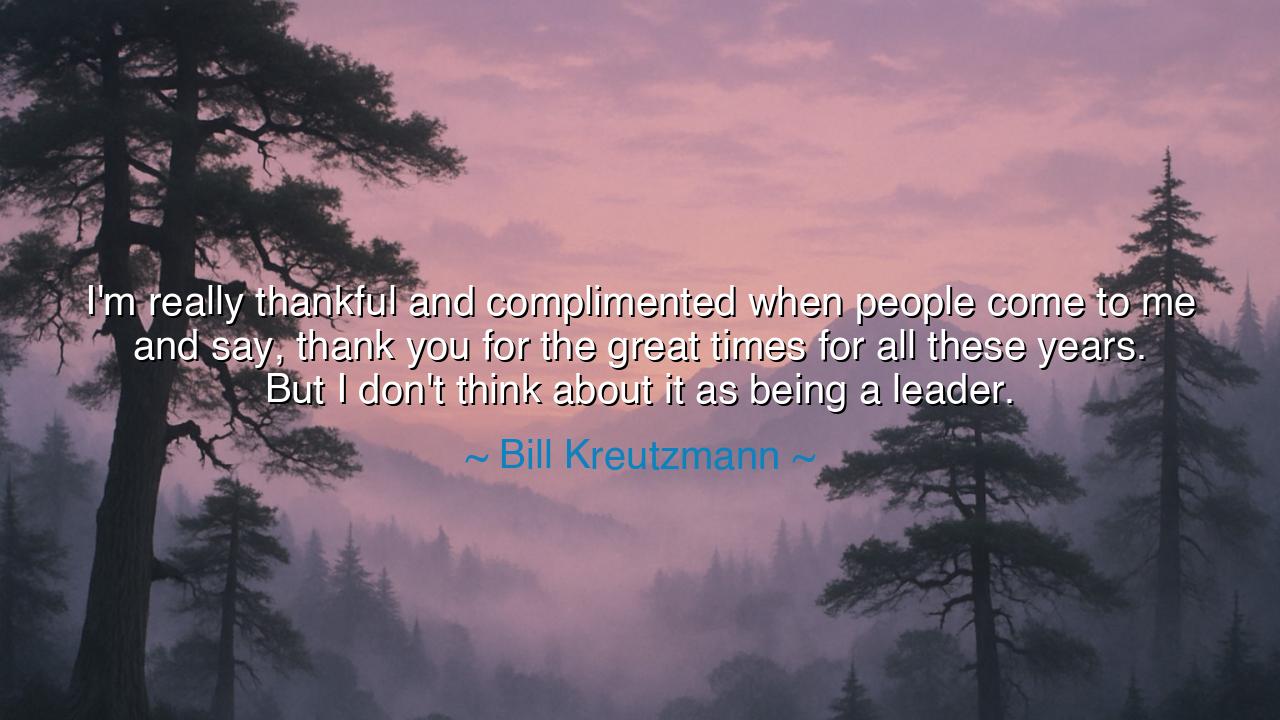
I'm really thankful and complimented when people come to me and
I'm really thankful and complimented when people come to me and say, thank you for the great times for all these years. But I don't think about it as being a leader.






When Bill Kreutzmann declares, “I’m really thankful and complimented when people come to me and say, thank you for the great times for all these years. But I don’t think about it as being a leader,” he speaks with the humility of one who has walked a path of music and memory, yet has not sought the crown of authority. In his words, there is both gratitude and modesty: gratitude for the people whose lives were touched by his art, and modesty in refusing the mantle of leadership, preferring instead to see himself as a servant of the music rather than its master. His voice teaches us that greatness is not always about commanding others, but about giving joy without demanding recognition.
The origin of this truth lies in Kreutzmann’s long years as the drummer of the Grateful Dead, a band that became more than music—it became a movement, a community, a shared way of life for countless souls. Fans approached him not as subjects to a king, but as companions on a journey of sound and spirit. They thanked him for “the great times,” for the memories that stretched across decades, for the moments of transcendence that music brought into their lives. Yet he does not claim to have been a leader, for in his eyes the band was never about hierarchy. It was about harmony—about many voices, many instruments, coming together in a single living rhythm.
History gives us examples of this same spirit. Consider George Harrison of The Beatles, who often stepped back from the limelight, content to let Lennon and McCartney carry the public’s gaze, while he quietly contributed songs of depth and power. Harrison never demanded the title of leader, yet his work enriched the whole. Like Harrison, Kreutzmann reminds us that one need not be at the forefront to shape lives profoundly. To give joy, to inspire, to serve the art rather than one’s ego—this too is a form of leadership, though he himself refuses to name it so.
There is also a lesson in Kreutzmann’s thankfulness. He does not take for granted the love and appreciation of those who approach him. He calls it a compliment to be remembered for the joy he helped create. This gratitude keeps him grounded, reminding him that the power of music is not in fame, not in status, but in the bond between performer and listener. In a world where many demand recognition, his words teach us the nobility of humility: to receive praise with grace, but not to let it define you.
His refusal to see himself as a leader carries its own wisdom. True leadership is often born of those who do not seek it. The ancients spoke of this paradox: that the greatest rulers were often those reluctant to rule, who led not from pride but from service. In his music, Kreutzmann offered rhythm, steadiness, and foundation, just as a leader does, yet he denies the title. This denial does not diminish him; it magnifies him, for it reveals a spirit free of vanity.
The lesson here is profound: greatness is not always about commanding or directing, but about contributing faithfully to something larger than yourself. If people thank you for the joy you’ve given them, accept it with humility, as Kreutzmann does, but never let it make you arrogant. True power is found in service, in giving without expecting crowns, in creating harmony rather than seeking dominance.
Practical wisdom follows. In your own life, strive not to be seen as a leader, but to serve well. Offer your talents, your presence, your labor to enrich the lives of others. If people give you thanks, receive it with a spirit of thankfulness, but remain focused on the work, not the title. Remember that leadership is not a name you call yourself—it is something others may see in you, whether you acknowledge it or not.
Thus, in the words of Bill Kreutzmann, we are reminded that the truest legacy lies not in claiming authority, but in giving joy. To be thankful for the gratitude of others, to remain humble amidst praise, and to measure one’s life not by titles but by the lives touched—this is wisdom. Let us, then, walk the path of service, offering what we have to the world, and leaving behind a music of our own that others may one day give thanks for.






AAdministratorAdministrator
Welcome, honored guests. Please leave a comment, we will respond soon